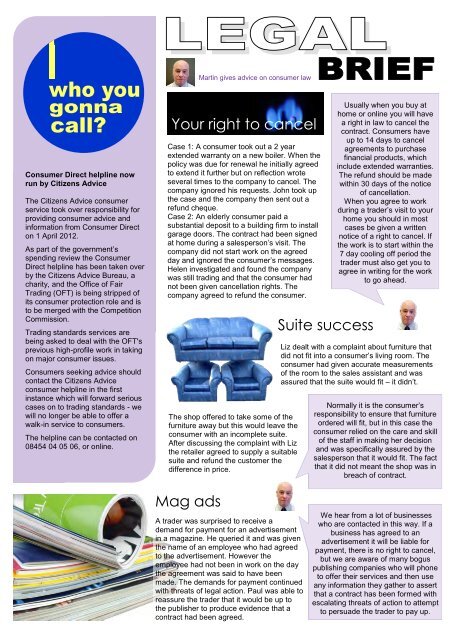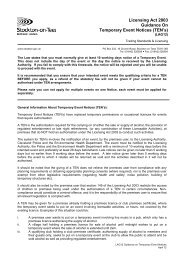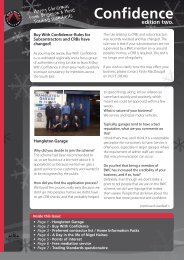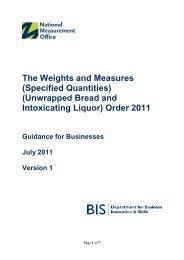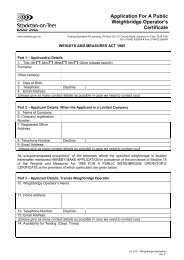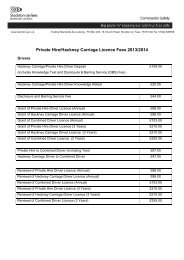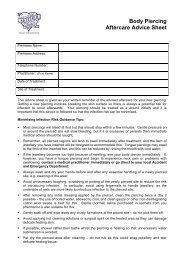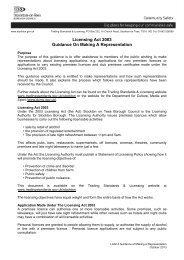Summer 2012 - Trading Standards Institute
Summer 2012 - Trading Standards Institute
Summer 2012 - Trading Standards Institute
You also want an ePaper? Increase the reach of your titles
YUMPU automatically turns print PDFs into web optimized ePapers that Google loves.
Martin gives advice on consumer law<br />
Consumer Direct helpline now<br />
run by Citizens Advice<br />
The Citizens Advice consumer<br />
service took over responsibility for<br />
providing consumer advice and<br />
information from Consumer Direct<br />
on 1 April <strong>2012</strong>.<br />
As part of the government‟s<br />
spending review the Consumer<br />
Direct helpline has been taken over<br />
by the Citizens Advice Bureau, a<br />
charity, and the Office of Fair<br />
<strong>Trading</strong> (OFT) is being stripped of<br />
its consumer protection role and is<br />
to be merged with the Competition<br />
Commission.<br />
<strong>Trading</strong> standards services are<br />
being asked to deal with the OFT's<br />
previous high-profile work in taking<br />
on major consumer issues.<br />
Consumers seeking advice should<br />
contact the Citizens Advice<br />
consumer helpline in the first<br />
instance which will forward serious<br />
cases on to trading standards - we<br />
will no longer be able to offer a<br />
walk-in service to consumers.<br />
The helpline can be contacted on<br />
08454 04 05 06, or online.<br />
Your right to cancel<br />
Case 1: A consumer took out a 2 year<br />
extended warranty on a new boiler. When the<br />
policy was due for renewal he initially agreed<br />
to extend it further but on reflection wrote<br />
several times to the company to cancel. The<br />
company ignored his requests. John took up<br />
the case and the company then sent out a<br />
refund cheque.<br />
Case 2: An elderly consumer paid a<br />
substantial deposit to a building firm to install<br />
garage doors. The contract had been signed<br />
at home during a salesperson‟s visit. The<br />
company did not start work on the agreed<br />
day and ignored the consumer‟s messages.<br />
Helen investigated and found the company<br />
was still trading and that the consumer had<br />
not been given cancellation rights. The<br />
company agreed to refund the consumer.<br />
The shop offered to take some of the<br />
furniture away but this would leave the<br />
consumer with an incomplete suite.<br />
After discussing the complaint with Liz<br />
the retailer agreed to supply a suitable<br />
suite and refund the customer the<br />
difference in price.<br />
Suite success<br />
Usually when you buy at<br />
home or online you will have<br />
a right in law to cancel the<br />
contract. Consumers have<br />
up to 14 days to cancel<br />
agreements to purchase<br />
financial products, which<br />
include extended warranties.<br />
The refund should be made<br />
within 30 days of the notice<br />
of cancellation.<br />
When you agree to work<br />
during a trader‟s visit to your<br />
home you should in most<br />
cases be given a written<br />
notice of a right to cancel. If<br />
the work is to start within the<br />
7 day cooling off period the<br />
trader must also get you to<br />
agree in writing for the work<br />
to go ahead.<br />
Liz dealt with a complaint about furniture that<br />
did not fit into a consumer‟s living room. The<br />
consumer had given accurate measurements<br />
of the room to the sales assistant and was<br />
assured that the suite would fit – it didn‟t.<br />
Normally it is the consumer‟s<br />
responsibility to ensure that furniture<br />
ordered will fit, but in this case the<br />
consumer relied on the care and skill<br />
of the staff in making her decision<br />
and was specifically assured by the<br />
salesperson that it would fit. The fact<br />
that it did not meant the shop was in<br />
breach of contract.<br />
Mag ads<br />
A trader was surprised to receive a<br />
demand for payment for an advertisement<br />
in a magazine. He queried it and was given<br />
the name of an employee who had agreed<br />
to the advertisement. However the<br />
employee had not been in work on the day<br />
the agreement was said to have been<br />
made. The demands for payment continued<br />
with threats of legal action. Paul was able to<br />
reassure the trader that it would be up to<br />
the publisher to produce evidence that a<br />
contract had been agreed.<br />
We hear from a lot of businesses<br />
who are contacted in this way. If a<br />
business has agreed to an<br />
advertisement it will be liable for<br />
payment, there is no right to cancel,<br />
but we are aware of many bogus<br />
publishing companies who will phone<br />
to offer their services and then use<br />
any information they gather to assert<br />
that a contract has been formed with<br />
escalating threats of action to attempt<br />
to persuade the trader to pay up.


